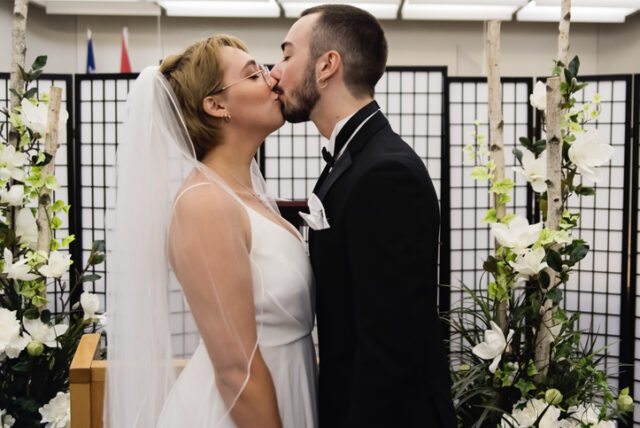Marriage is a major decision, and rushing in for the wrong reasons sets you up for disaster. While love is important, it’s not enough to sustain a healthy, lasting partnership. If you find yourself considering an “I do” primarily because of the following factors, you might need to pump the brakes.
1. To “fix” someone

It’s a romantic trope, but dysfunctional: believing your love can change a fundamentally problematic person. If they have addictions, anger issues, or are deeply immature, your marriage won’t magically transform them. Change has to come from within them, not from outside pressure. Marry them as they are, not the fantasy of who you hope they might become.
2. To escape from a bad situation

Whether it’s a toxic family, a dead-end job, or feeling left behind by your peers, getting married to escape your current life is a recipe for trouble. Making a major life decision out of desperation, not genuine desire creates a shaky foundation. Address your unhappiness independently. Build a strong life for yourself first, then find a partner to share it with.
3. Because it’s “time”

Love can be found at any point in life, according to Better Help. Age deadlines, ticking biological clocks, or societal pressure are terrible reasons to get married. Your timeline is irrelevant – finding the right partner is what matters. Rushing into marriage just to hit an arbitrary milestone often means settling for less than you deserve. Being single is far better than being in an unhappy marriage.
4. Fear of being alone

Some people would rather be unhappily partnered than single. If this fear drives your decision, you haven’t developed the independence and self-love needed for a healthy relationship. You’re likely to project this insecurity onto your partner, creating codependency. Learn to enjoy your own company, then seek a relationship because it adds to your life, not because it fills a void.
5. To prove something (to yourself or others)

Marrying to show off, make an ex jealous, or prove your desirability builds a relationship on ego, not love. When those external validations fade, you’re left with the reality of your potentially incompatible partner. Your self-worth shouldn’t hinge on your relationship status. Find partners who value you for who you are, not the ring on your finger.
6. Because you already invested so much time

The sunk cost fallacy traps people in bad relationships. Just because you’ve been together for years, doesn’t mean you have to get married. If it’s not working, it’s not working – the amount of time spent doesn’t change that. Don’t let “wasted years” overshadow an unhappy future. It’s okay to walk away.
7. You’re swept away by the fantasy, not the reality

Picturing the perfect wedding is easy, but the day-to-day reality of marriage is less glamorous, according to Psychology Today. If you’re fixating on the dress, the party, or the idea of being “married,” you’re overlooking the actual work of building a life together. Can you handle the mundane, disagreements, and compromises that come with real partnership?
8. You’re ignoring serious red flags

Deep down, you know there are major issues – incompatibility, lack of respect, controlling behavior – but you minimize or excuse them hoping things will magically improve after the wedding. They won’t. Problems usually get worse, not better, once the honeymoon phase fades. Listen to your gut. Don’t brush aside those nagging doubts under the pressure to “just get it done.”
9. To make someone else happy

Marrying due to pressure from your partner, family, or cultural expectations leads to resentment, not a happy marriage. Your love life is YOUR decision, not something to do out of obligation or to please others. People-pleasing at the expense of your own needs is unsustainable. Stand up for your own happiness.
10. To gain security (financial or otherwise)

Marrying for money, a green card, or a shortcut to stability creates an imbalanced power dynamic. You’re relying on the other person for your well-being, breeding resentment and eroding respect over time. Build your own life. A partnership should be between equals, not a dependency.
11. Because everyone else is doing it

Feeling left behind as friends and family members pair up can create a sense of urgency. But your relationship timeline should be determined by your own readiness, not mirroring that of others. FOMO (“fear of missing out”) is a poor foundation for a life-altering decision.
12. Pregnancy (accidental or pressured)

While sometimes “surprise” pregnancies blossom into happy marriages, more often they create marriages borne of necessity, not genuine compatibility. A child deserves to be brought into a stable, loving partnership out of choice, not circumstance. Rushed marriages due to pregnancy often face increased stress and strain, the National Institute of Health confirms, risking harming the child the couple is trying to do right by.
13. You don’t know how to say “no”

If you find yourself swept toward engagement and marriage despite doubts, simply because you struggle to stand up for yourself or don’t want to disappoint anyone, that’s a major red flag. Marriage requires the ability to communicate honestly and advocate for your needs. If you lack this now, resentment is likely brewing beneath the surface.
14. Ultimatums

“Marry me or I’m leaving you” pronouncements are about control, not love. If your partner forces your hand this way, it suggests a lack of respect for your independence and willingness to use emotional manipulation. Ultimatums are unhealthy, even if the outcome right now is what you want.
15. It seems easier than breaking up

Sometimes the inertia of a long-term relationship makes a messy breakup seem so daunting, marriage feels like the path of least resistance. This is a recipe for passive-aggressive misery. Mustering the courage to walk away from something wrong is always better in the long run than committing to a life you don’t truly want.








